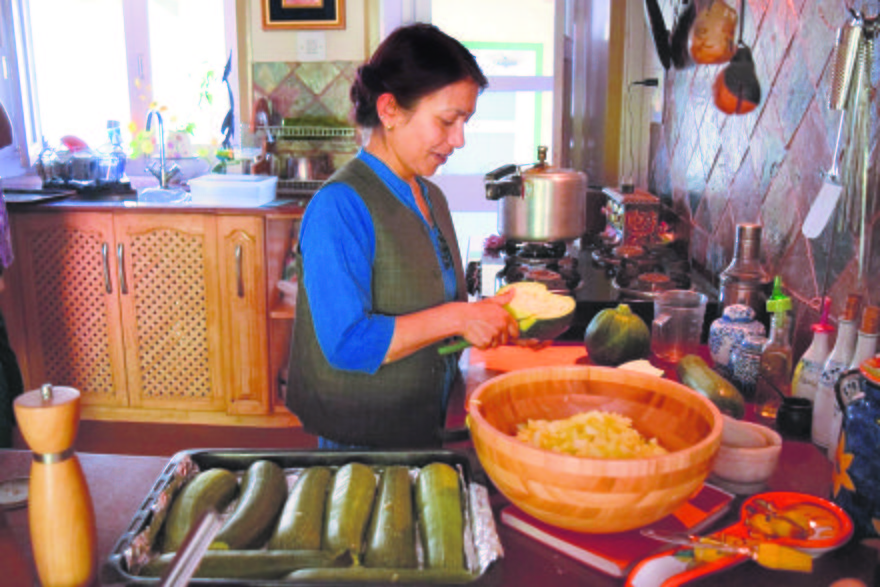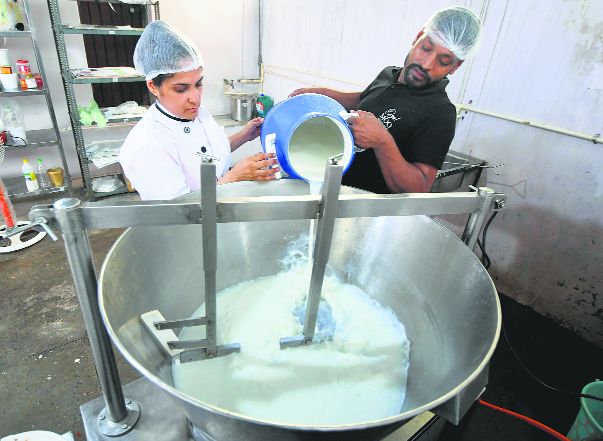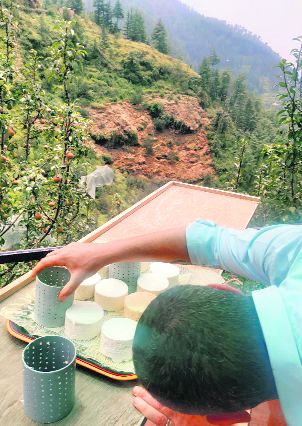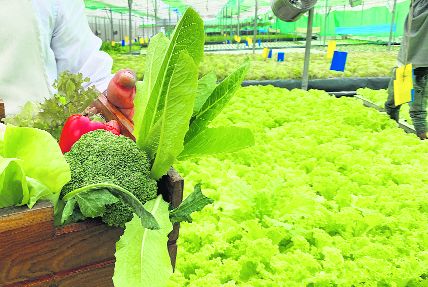
A Kotkhai (HP)-based farm owner makes fresh zucchini chutney. Some farmstay owners turn the extra produce into jams and juices and share with their guests. Tribune photos
Puneetinder Kaur Sidhu
I have often juddered along Himalayan country roads to procure fresh buffalo milk from the nomadic Gujjars and watch a dexterous cheese maestro transform it into soft, creamy mozzarella within a matter of hours. These crack-o’-dawn drives prove every bit as gratifying as the consequent bocconcini (small mozzarella balls), tomato and basil salad that experienced curators conjure up later in the day. Despite this demonstration of will and skill every time we crave natural, additive-free food is neither possible, nor practical, for a speedily growing number of consumers, knowledge about the source and quality of ingredients — grass-fed bovines, hand-crafted cheese, farm-fresh tomatoes and herbs, in the above instance — has come to lend gastronomy that much more flavour, and oomph.

Mohali-based Preeti Kaur produces mozzarella, malai paneer, fresh butter and lassi in limited quantities on pre-order. Tribune photo: Ravi Kumar
This, coupled with a well-informed willingness to pay the expected premium, has seen the demand for small batches of traditionally made foods rise in recent times. It is also evident that pandemic-spurred conversations around health and nutrition have firmly placed the art back in artisanal.

Months of confinement this past year has led homemakers, home-chefs, as well as professionals, to convincingly convert their passion for a healthy and sustainable lifestyle into a well-received enterprise. A trusting customer base has been built through word-of-mouth references, a strong online presence, pre-orders, and direct-to-home deliveries. While curated online marketplaces like Kaze Living and Sprig have helped small artisanal brands find a platform, this emerging trend has also garnered the attention of the brick-and-mortar retail sector.

A sizeable shelf space can be found dedicated to hand-made foods. Sisters Bani Cheema and Sukhmani Cheema Sandhu, both advocates of healthy snacking, took it a step further, reclaiming a floor of their café in Chandigarh to accommodate their artisanal initiative, Nabobs Homemade. Their limited stock is sourced (some on pre-orders) from across India and includes hand-made and organic relishes, jams, honey, cookies and ghee, among others.

With this formerly niche market propelled into the spotlight by an appreciative audience, the demand for both table and gourmet foods is being matched by a remarkable number of newly minted micro-kitchens. These kitchens fashion all manner of cheese, chocolates, breads, fruit preserves, beverages, cured meats, vinegars and oils. Home-made spice mixes, condiments, even fresh produce, have slowly invaded a space that was, until a few years ago, driven primarily by gourmet foods. “We produce and transport roughly 800 kg to a tonne of lettuce, salad greens, micro-greens and herbs to our Delhi-based customers every week,” shares Anubhav Das of Red Otter Farms. Although they pre-date the pandemic by a couple of years, their subscription list has grown substantially of late. Resulting from their own desire for clean and contaminant-free greens, their aquaponics facility in Kumaon (Uttarakhand) employs modern techniques, predictive analytics, and sustainable practices to fill this yawning gap for about 150 eager customers for now.
Cheesy solutions
Finding a lack of quality dairy on her relocation to Mohali from Mumbai last year, Preeti Kaur decided to take matters into her own hands. “After months of searching, I finally found a farmer selling pure pasture-fed buffalo milk. Most of them tend to mix it with cow milk.” Equipped with a good knowledge of the space through her former husband’s dairy business, this self-taught cheese-maker began hand-crafting mozzarella, malai paneer and ice-cream for personal use. Extras were shared with friends. As word got around, the demand for her 100 per cent natural dairy produce grew and the Oye Moo Artisanal Dairy came into being. Her repertoire has since grown to include burrata (cheese made from mozzarella and cream), fresh butter and lassi, but she still only produces pre-ordered and limited quantities.
Then again, when Debarati and Francois Laederich dropped anchor in Mashobra, near Shimla, they weren’t really seeking solutions to existing needs. Rather, a change in pace and place after winding up the family’s hotel business in Puducherry. “The abundance in cow milk and an atelier-amenable climate couldn’t be ignored for long. We succumbed,” laughs Debarati. Amiksa Cheese started production in November 2019 with an array of hand-made soft, hard, smoked, and spreadable cheeses, with cheddar, gruyere, zuri and borsalino disappearing off the shelf fastest. “On an average, we process approximately 100 litres of milk to produce 10 kg of cheese per day. We work with a cluster of 15 families from a village located just a couple of kilometres away. This ensures the unpasteurised milk is at its freshest most when it reaches us,” explains Francois, who trained in the art of cheese-making in Aurillac, France.
Jam sessions
In most cases, this trend is driven not so much by business, as it is by a passion to craft and consume good food using family recipes and traditional methods of preparation. For the fruit-growing regions of Himachal Pradesh, preserves, pickles and juices have long been a natural outcome of a surplus harvest. Way before farm-to-fork became a catchphrase, households have been handpicking, washing, jelling, and bottling produce for personal consumption.
Devanshe and Michael Lidgley, who run a farmstay at their orchard in Kotkhai, reveal that it was only when guests began expressing interest in buying their jams and juices — on a regular basis — that they decided to give retail a serious thought. “We’re waiting for the necessary licences and permissions to come through before taking Himalayan Orchard produce to a wider customer base.”
It is no different in the trans-Himalayas. Letting excess fruit rot was not an option for Kunzes Angmo, Ladakh-based founder of Artisanal Alchemy, a curated gastronomy initiative. Her family’s association with the hospitality industry helped. It provided a ready audience for a sizeable amount of her jarred apricot preserves sourced directly from their orchards in Leh and Nubra. Content with donating the remainder to monasteries or gifting edible mementos to friends and family, her recent move to retail is driven by encouragement, and a well-received one thanks to the consumers’ return-to-real desire storming the artisanal food space. To ensure consistency in taste, she personally handpicks, washes, and cooks the fruit over a wood-fire, one tree at a time.
Wellness wisdom
With nutritious-eating habits having grabbed popular imagination, ancient grains have taken centre-stage once again: amaranth, barley, sorghum, pearl and finger millets have gradually entered our kitchens in one form or the other. Ammi’s Essentials, a Ludhiana-based lockdown outcome, is one such venture applying age-old wellness wisdom to their product. They specialise in healthy snacking alternatives and unsurprisingly amaranth shows up often, bound together with jaggery in laddoo form, or as a kari patta-infused savoury mix. And although eating right was not new to Jasmeet Kukreja’s business household, it was her desire to work with small organic farmers that spurred her to take the plunge into the artisanal space.
Namrita Sikka, on the other hand, began developing nutrient-packed recipes for personal use once her son was born. Unwilling to feed him the highly processed imported foods widely available in supermarkets, she chose instead to make her own cookies with quality ingredients. Her limited range of products (Hey Grain) includes ragi and oats cookies, seeds and bran cookies, besan cookies and tulsi, ginger and honey digestive cookies. The organic ragi and oats are sourced from farms in Haryana while they grow their own wheat.
Home productions
- Blue Tokai Coffee: It specialises in single-origin, small-lot coffees farm-sourced from across India and offer annual coffee subscriptions.
- Flying Squirrel: They source their fresh roasted whole beans and ground coffee — single-origin and blends — from plantations in Coorg.
- Anandini Himalaya Tea: Founded by tea sommelier Anamika Singh, it specialises in quality single estate teas and blends with origins in Kangra valley.
- Himalayan Cheese: Located in Pahalgam, it was founded by Dutchman Chris Zandee. They source their milk from Gujjars, specialities include gouda to kalari–fried Kashmiri cheese.
- Darima Farms: Named after the Uttarakhand village they are located in, they prepare their range of artisanal cheese from milk sourced directly from local farmers.
- Under The Mango Tree: It is a social enterprise that promotes beekeeping in rural Maharashtra and Karnataka to enable diverse livelihoods and improved incomes. They produce pure organic honey with flavours ranging from jamun to eucalyptus.
- Tenacious Bee Collective: It was started by a group of honey-loving friends to produce raw, untreated Himalayan honey for the like-minded. Based in Kangra, their objective is to also revive the diminishing bee population of Himachal Pradesh.
- Mountain Muse: Located in Ladakh, they specialise in vegan, gluten-free and refined sugar-free mountain produce using re-imagined recipes. Think Ladakhi apple and Mamra almond granola. Or, shade dried Kashmiri lavender.
- Mason & Co: Based in Puducherry, they are best known for handcrafted bean-to-bar chocolates made from finely-ground and aged cacao sourced locally.
- Donna Pastaia: It is the lockdown baby of two passionate home cooks who decided to hand-make dry and package pasta for an intimate circle of friends and family, using quality ingredients and traditional methods.
Join Whatsapp Channel of The Tribune for latest updates.



























